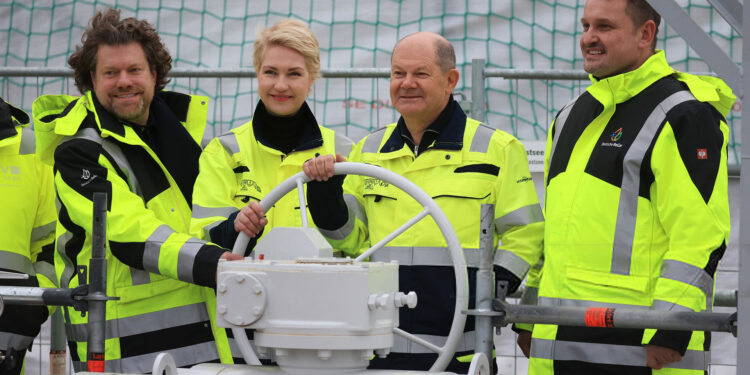Berlin Germany is experiencing a cold winter at the present time, especially at the beginning of December, which witnessed a severe cold wave that increased pressure on gas consumption for heating. However, Berlin confirms that it has prepared sufficiently and that it has enough to face the current winter without problems, with an almost complete cessation of its dependence on Russian gas.
“Despite the cold wave, the filling rate of gas tanks in Germany is more than 90%, and this is one of the biggest reasons that makes us optimistic about the situation of gas supplies in the coming months,” a spokeswoman for the Federal Association of Water and Energy Industries confirmed to Al Jazeera Net.
German indicators
The price of gas consumption per household in Germany decreased by about 30% at the annual rate for the year 2023 compared to the rate of the last quarter of 2022, and moved from 20 cents per kilowatt hour to 13.99 cents, but the rate did not reach what it was in 2021, when it was The average price is only 7.06 cents, according to December data released by the association.
This decline is also reflected in the data of this association in the prices of natural gas contracts offered by German gas distribution companies, as they fell from 118 euros per megawatt-hour in 2022 to 54 euros this year.
According to the same source, Germany has the highest storage capacity in the European Union, at about 254.8 billion kilowatts.
In order to be free from Russian gas, Germany opened 3 floating terminals to store imported liquefied gas, with a horizon of 5 terminals. It also searched for new partnerships across the world, as Germany is expected to receive shipments of Qatari gas starting in 2026 and for a period of 15 years.
Stop relying on Russian gas
Data confirm that direct natural gas flows to Germany come from Norway, then the Netherlands, then Belgium, and Russia is no longer among Germany’s suppliers, but is present indirectly through a third party. The association confirms to Al Jazeera Net that “Russia has stopped gas shipments through pipelines, and the quantities have been compensated through import operations from other countries such as the United States, which exports most of its shipments to Germany.”
Stopping the supply of Russian gas to Germany was not entirely Berlin’s decision, given that Germany was not planning an immediate halt to that, as the Russian company Gazprom stopped exporting gas to Germany in September 2022, specifically via the Nord Stream 1 pipeline, while Germany stopped accrediting… Nord Stream 2 pipeline project.
Martin Vladimirov, director of the Energy and Climate Program at the Center for Democracy Studies, told Al Jazeera Net: “Germany has made significant progress in reducing gas consumption in general by about 20% over the past two years, and has also diversified its sources of consumption away from Russian gas.”
He points out that natural gas prices in Europe have decreased in Europe, which has become “able to manage gas storage facilities better,” but he confirms that Germany still receives quantities of Russian gas indirectly, through gas pipelines from Austria or Belgium.
Germany relied on Russia for half of its gas imports due to the cheap price, which enabled giant German companies importing gas to achieve large profits, but Moscow’s cutting off of gas supplies pushed these companies to the brink of bankruptcy.
A study by the Center for Democracy Studies, in partnership with the German Friedrich Naumann Foundation, confirms that these companies were pressuring Berlin to strengthen relations with Moscow, but Moscow’s invasion of Ukraine turned Germany into one of the European Union’s most vulnerable countries in terms of energy security.
Caution is a must
Opinion polls this winter did not show major concerns, unlike last winter, which caused major problems for residents, especially those with limited income, when a number of gas companies stopped proposing long contracts, including raising the price two or three times.
However, despite these indicators, the Federal Association of Water and Energy Industries confirms that filling gas tanks completely does not alone guarantee that we will get through the winter without problems, explaining that “it is very important to rationalize the use of energy, to support the continuity of energy supplies, which will reflect positively on people’s pockets.”
In this context, the federal and state governments are intensifying campaigns to rationalize energy consumption, and Berlin has allocated a large support package for the population with a total value of 200 million euros to cap electricity and gas prices in particular, as well as to confront inflation, and hundreds of thousands of residents have received direct financial support.
For his part, Vladimirov explains that Russia is still the second largest supplier of liquefied natural gas to Europe, and that the volume of liquefied natural gas coming from Russia has increased since the start of the war, and that 2023 will even be a record year for these Russian supplies.
The expert warns that one of the reasons for the decline in prices is the continued presence of Russian gas, while if Europe – including Germany – stops Russian gas completely or imposes more sanctions, it is possible that prices will rise partially, but he stresses that Europe is in an urgent need to “separate strategic about Russian gas,” and “it is capable of doing so.”



